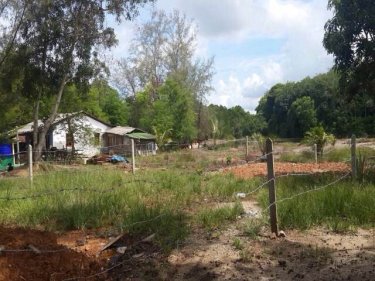The problem is, other families of squatters who are not sea gypsies are already living on the new plots - and the recommended alternative is five kilometres from the ancestral sea gypsy home on the beachfront.
You don't have to be an anthropologist to realise that the sea gypsy cultures and traditions, all based on living and working beside the sea, will quickly be destroyed if they are forced to live elsewhere, among people with other cultures and traditions.
This thought does not appear to be understood by the practical souls at Phuket Provincial Hall, who seem to think sea gypsies can simply remove the ''sea'' from their lives, and carry on as if nothing has changed.
A claim is being made to a tract of land that is home to 170 families among the 323 families (population 1490) who make up the Koh Sireh sea gypsy community, where they have lived on the coast east of Phuket City for at least 100 years.
Although the land claim has yet to be tested in court, five sea gypsy families are being sued in what's seen as a preliminary battle.
In an effort to rescue the situation, the Phuket administration is offering alternative accommodation about five kilometres back towards Phuket City from the Laem Tukkae sea gypsy village, on Forestry Department land opposite the monkey mangroves tourist attraction in Sri Suthat Road.
The trouble is, 10 families already have homes built on the 45 rai of land the Phuket administration has earmarked for the sea gypsies, and the property is already edged by a family shelter and other buildings. While the Tah Jeen Canal is nearby, the sea is nowhere close.
Any first-year anthropology student would be able to advise local officials that separating the sea gypsies from the sea almost certainly will lead to the destruction of their way of life and a probable downward spiral of health issues and depression, leading to early deaths and social disintegration.
Precisely why the Phuket authorities are not supporting the sea gypsies and challenging the claim by the person with the land chanote has yet to be made plain.
If the village is split in two by moving 170 of the 323 families, the futures of all of them will be clouded and probably marred by misery.
Opas Jidpan, the sea gypsies' village chief, said: ''We don't want to move, We need the beach. What about our culture? What about our way of life?
''If we are forced to move away from the beach, our way of life is bound to change.
''We are going to have to be cut off from our belief systems. We don't want to move. What else can we say?''
Sea gypsy Soros Pramongkit said he believed the land on which the sea gypsy village now sits was granted to the local community in perpetuity in 1987 by a former Prime Minister of Thailand.
Speculators are also believed to be eyeing the Laem Tukkae beachfront as expensive resorts spring up in other parts of Koh Sireh.
With squatters already in the place being recommended for the sea gypsies, the chances are both the group that is forced to move and those who stay will suffer from the forced division of their already small, vulnerable community.
And with an administration that doesn't understand their real needs, the sea gypsies of Phuket are fighting for their existence.


.jpg)
.jpg)
.jpg)



Sea what they do to the marginalized,the disenfranchised, those without baht or contacts in high places? Sea Gypsies, Burmese laborers, Rohingya, Northern hill tribes, issarn rice farmers, and the beat goes on..
Posted by dean on May 18, 2014 03:15